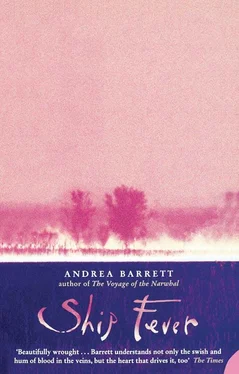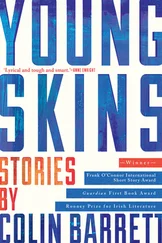When Bianca walked through the door, her hair brushed and her clothes changed and her hands full of paper bags from the fake-French bakery down the street, Rose couldn’t keep from leaping on her. “How did you get out?” she said. “How’d you get back in? Did you sleep?”
“Explain the obscure by the more obscure,” Bianca said. “The unknown by the more unknown.”
There was a time when Rose would have understood exactly what she meant. Suky had taught us a secret technique, which had to do with water and the faces of the dead and could not be talked about. Nor could it be explored alone — we’d both tried it separately and failed. When we were young, though, and together, we had made it work.
Bianca set her offerings on the desk: steaming coffee and rolls and butter and jam. From another bag she pulled two new wineglasses, still with price tags on their feet, and a bottle of organic cranberry-raspberry juice. She poured juice into the glasses, disappeared into the lab with them, and returned.
“Cheers,” Bianca said, holding one out to Rose and raising the other to her lips.
Ruby fluid: magic potion; we knew better than that. Rose has never acknowledged that she knew what Bianca added to the glasses. But she did know, as she also knew what it was meant to do: fuse our vision back together, the way Suky had fused our names. But we didn’t call on Suky that day, because Rose continued to resist the idea as if it, not the potion, were poison. And so nothing changed between us, although we were reminded of how much we loved each other.
We stop here, usually, or actually a little before this: If one of us is telling tales to a stranger we stop with the raised glasses and the toast. As we do with our history, we try to maintain a light tone when we talk about that night. We try to make it sound like a tale of youthful excess, pharmaceutical madness; a last gasp from the seventies. The sort of escapade someone older and wiser can look back on with a smile.
Time passed. Lots of things happened to both of us, some important and some not. We met now and then, when Bianca passed through Boston on the tail end of some journey, but after that night we met casually, mimicking the interaction of any pair of sisters. Mostly we talked on the phone.
Our lives continued like this for almost a decade, until our father got sick and we went to Hammondsport to see him. During the time of his dying we saw each other intensely, intently, but where it counted we were as separate as stones and it seemed clearer than ever that the ruby fluid had failed us.
A year after that, though, we returned to Hammondsport for the first anniversary of our father’s death. What happened then is not a part of our history. We swore we’d never tell anyone and still can hardly mention it between us. [3. Speaking with Suky]
You said, “Look down into the water. A hole will open if you spin the surface with your hand or a stick, and you will see what you need at the base of the hole.” We’re sure that’s what you said. Under clear skies, on a hot day, in a greenpainted Comet with natural trim, during a summer when we were still children and you were still around. We spun the water beside the boat with an extra paddle, twirling and twirling until a vortex formed. Looking down, into the hole that seemed to lead to the bottom of the lake, we saw grandpa Leo’s face.
And today?
Today we spun the water and found you.
Why did you wait so long?
It’s only been a year. It took us that long to get ready. We were drowning in memories of the last time we’d seen our father.
When we met here that time, we slept downstairs on a large piece of furniture not quite either sofa or bed. The upholstery was smooth to the touch, except for the spots where the dogs had shredded it. There were arms and backs and edges, which made it like a sofa; then big stretches of ambiguous flatness the size of a bed. We were sleeping there, in the basement, because there was no other place for us. Your house — his house, our house — was gone, and the acres of vines and the stone buildings, the casks, the vats, and all the equipment, all the wine. We had never seen the place our father had rented after his wife had made him sell our house. Both of us lived elsewhere, with other men.
We had never shared a bed with each other, and except for a night in a lab in Boston we had not slept in the same room since we were little girls. We felt uncomfortable lying next to each other and so we moved until we were lying head to foot and foot to head, toes near each other’s ears. In that position, with the glass doors letting in moonlight and shadows and the sound of the water at the edge of the lawn, we rested and talked. The painting of you had been moved from the living room in the old house to the hallway between the half-finished basement room and the extra toilet.
Who has it now?
The painting?
The painting.
We don’t know. It’s gone. We had rushed to Hammondsport after his phone calls to find him alone except for the two huge dogs in a filthy and uncomfortable house. The dogs followed our father everywhere. They slept on his bed, laid their heads on his knees, looked at him imploringly. He was weak and could no longer walk them, but although they were frantic with restlessness they would not leave his side. They growled and lunged at us at first, and even after several days they leapt from our father’s bed and barked each time we moved from room to room or even from chair to chair. At night we willed ourselves not to stir and wake them. In the mornings we watched as our father groomed them with the last of his energy. One had white hair, very long, which flew out with the strokes of the comb. The other had hair that was shorter and brown. Our father’s arms and legs had grown very thin but his middle bulged from the tumors in his liver.
And what has happened to these dogs?
The dogs are gone; it’s a long story and you don’t want to know. On the first night we were home we fed them biscuits and then rubbed a chicken with oil and garlic and herbs and roasted it in a hot oven for an hour and forty-five minutes. Our father’s hands began to shake as the smell filled the house. “I have no appetite,” he said, but this turned out not to be true. He had no energy with which to cook or shop, and the foods he managed to make for himself were in no way appetizing. His wife was there but not there, present but absent; she had taken a job and an apartment in Syracuse and came home only on weekends then. As there was no one around to cook for him, he had convinced himself that the feeling he felt wasn’t hunger. But when we sat him down and placed the food in front of him water came into his eyes and his mouth. His head was hardly higher than the surface of the table. When he lifted his fork he was so anxious to greet the food that his neck craned and his mouth thrust forward. He ate very fast, smearing his mouth with fat and dropping fragments onto his shirt. His irises were pale blue against a field of yellow shot with red. His hands were heavily wrinkled, dry-skinned, swollen, and discolored. Earlier, one of the dogs had rested a paw on his forearm and left behind a trail of bruises.
What did he look like?
Didn’t we just say? Dry, pale, shrunken, shriveled. Not the way you remember him. The top of his head came below the chin of one of us, below the nose of the other. His hair was thin and gray and the skin on his forehead was mottled. When he walked his legs were unsteady and splayed. His hands shook until he’d had the first two or three drinks of the day. After they steadied, he cut apples in half and tossed them at the dogs, who adored them. The dogs also liked grapes, he said, but in July, when we visited him, the grapes here were only wishes.
Читать дальше
Конец ознакомительного отрывка
Купить книгу












